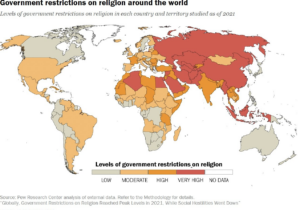In year two of a polarizing pandemic, America could use a reminder of the unifying blessings of freedom. We need to find ways to break through our political dysfunction where we seemingly slouch from one unprecedented challenge to the next. To renew our national spirit, we must rebuild our refugee resettlement program.
Sharing the blessing of living in this vast nation with those in need of a new home can help us see beyond our fractures to a higher plane of classical liberal consensus. Our nation’s resettlement program has fallen short of freedom’s promise in recent years. Its comeback could be a conduit for our own.
When the US commits to providing refuge to those fleeing persecution and oppression, our resettlement program is an example not just of goodwill, but of good governance. We have a rich history of serving our new, vulnerable neighbors through a network of federal entities working in concert with states and local communities. American greatness is strongest through service.
In modern American politics, few leaders have held as sunny a view of freedom’s promise as Ronald Reagan. On his last day in office, President Reagan presented the Presidential Medal of Freedom to Ambassador Mike Mansfield and Secretary George Shultz. It was at this ceremony where he gave his final speech as president.
He began by reading a letter: “a man wrote me and said: ‘You can go to live in France, but you cannot become a Frenchman. You can go to live in Germany or Turkey or Japan, but you cannot become a German, a Turk, or a Japanese. But anyone, from any corner of the Earth, can come to live in America and become an American.’” This, Reagan thought, was our competitive advantage:
We lead the world because, unique among nations, we draw our people—our strength—from every country and every corner of the world. And by doing so we continuously renew and enrich our nation. While other countries cling to the stale past, here in America we breathe life into dreams. We create the future, and the world follows us into tomorrow. Thanks to each wave of new arrivals to this land of opportunity, we’re a nation forever young, forever bursting with energy and new ideas, and always on the cutting edge, always leading the world to the next frontier.
Reagan told the gathered guests a story of a Cuban refugee who felt lucky he had America as a place to escape communism. He told them of a German prisoner of war who fell in love with the American farmland on which he worked during his compulsory stay. “This quality is vital to our future as a nation,” the president advised, “if we ever closed the door to new Americans, our leadership in the world would soon be lost.”
While our land has many entry points and a few walls worth debating, focusing on refugees is an important place to start because this program reflects who we are as a nation. For Christians, the resettlement program matters for religious freedom, as my Ethics and Religious Liberty Commission (ERLC) colleague Chelsea Patterson Sobolik wrote in this publication in 2019. Plus, many refugees are our brothers and sisters in Christ fleeing persecution. We see in the refugee the desire we ourselves know—to live according to our beliefs in a land where no one shall make us afraid.
Engagement from the White House is essential because the president sets the resettlement ceiling—the annual cap to the number of refugees the country welcomes. Since the Refugee Act of 1980, the ceiling before the Trump administration ranged from as high as 230,000 to as low 67,000. The historic annual average hovers near 95,000.
President Donald Trump came to power during a time of significant global displacement. By the end of 2018, 70.8 million people had fled their home countries, saddling this era with the largest number of refugees and internally displaced people globally since World War II. In 2017, President Trump set the ceiling at 50,000 and dropped it each year, leaving it at 15,000 for 2021. These successive cuts not only closed the door to many seeking safety now, but also starved the pipeline needed to provide harbor in America in the future. Refugees integrate into our local communities through government and non-profit partnerships. Without refugees moving through the pipeline, agencies atrophy.
Our ability to advance human rights is in peril during this era of dire global need for democratic leadership. Persecution always increases when authoritarian strongmen rule. Democracies must be ready to oppose rising dictators in part by offering safe harbor for the people left in their abusive wake. For example, as the tyranny of the Chinese Communist Party expands over Hong Kong and deepens into Xinjiang, the US could counter China morally by welcoming Hong Kongers and Uighurs as refugees, as Olivia Enos of The Heritage Foundation advocated for recently in Foreign Policy.
Part of the nationalist arguments that produced the precipitous cuts to the refugee ceiling centered on security concerns over terrorism. In 2016, the Trump campaign’s comparison of Syrian refugees to a bowl of poisoned skittles was an answer in search of a question. The refugee program is the most thorough admissions process into the US. The screenings a person must complete involve both the United Nations Refugee Agency and the United States Refugee Admissions Program, which includes numerous security and intelligence reviews. This thorough vetting has protected the program from abuse by those who would wish the US harm. Not a single refugee of the three million admitted since the 1980 legislation has killed an American in a terrorist attack.
Knowing these security assurances, we ought to then seek a consensus that zeroing out the program is as bad a policy as open borders. Recommitting to refugees within those guardrails would provide policymakers an opportunity for a debate that builds up the nation. Refugees enrich our communities, contrary to the demagoguery that undermines public empathy for them. The resettlement program has enabled remarkable talents to become Americans and pursue the American dream, such as Vietnamese refugee David Tran, who created the popular Sriracha hot sauce after resettling in the US. The resettlement ceiling discussion is a worthwhile debate with a variety of good-faith positions.
Thankfully, an opportunity to rebuild may be at hand with President Joe Biden’s recent executive order on refugee admissions. Among other directives, the order initiates reviews of the federal government’s resettlement procedures. This is a start, but more is needed.
The coronavirus pandemic will one day end, and we ought to use this time of restricted global travel to invest in the resettlement pipeline’s infrastructure. We can begin by rebuilding our processing capacity overseas and resettlement agencies here at home so that when our door can reopen, our welcome mat is ready.
During the 2020 campaign, President Biden promised to “set the annual global refugee admissions cap to 125,000, and seek to raise it over time.” His recent order struck an aspirational tone, that our tradition of leadership on refugees “provides a beacon of hope for persecuted people around the world.” These changes by the new administration mark an encouraging step toward relighting that beacon of leadership. Raising the refugee ceiling is the critical next step.







 Live in the DC area? Sign-up for Providence's in-person events list!
Live in the DC area? Sign-up for Providence's in-person events list!